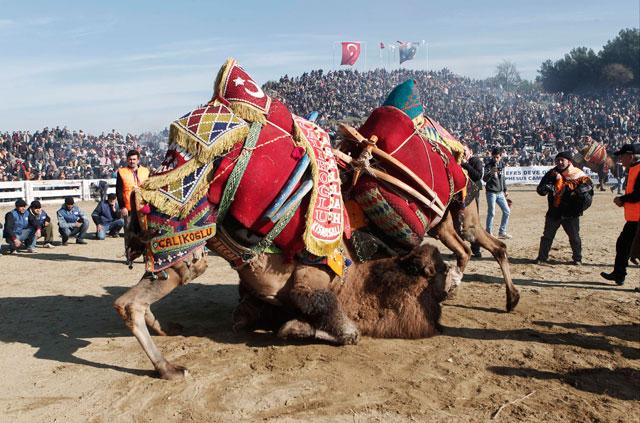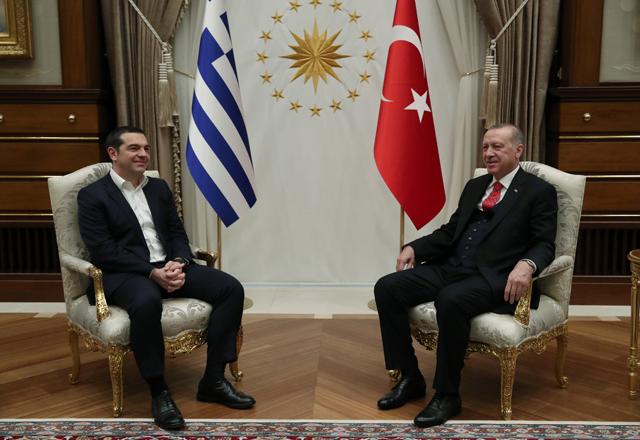You are here
Erdogan stirs trouble over 1923 Turkey border treaty
By AFP - Oct 01,2016 - Last updated at Oct 01,2016
ISTANBUL — President Recep Tayyip Erdogan has stirred up controversy over the treaty that almost a century ago set the borders of modern Turkey, alarming both neighbouring Greece and secular opposition at home.
In a speech Thursday, Erdogan for the first time rejected the notion that the 1923 Treaty of Lausanne was a "victory" for Turkey and wistfully lamented the loss of Aegean islands which are now Greek territory.
The treaty — the founding basis of the modern Turkish state out of the ruins of the Ottoman Empire — has usually been seen inside the country as a triumph of its secular leadership led by Mustafa Kemal Ataturk.
For the secular opposition in Turkey, Erdogan's comments have represented another dangerous lapse into neo-Ottomanism, signalling his regret that Ankara does not control territory stretching from Balkans to Africa as Constantinople did in Ottoman times.
But for pro-Erdogan commentators his remarks were a timely reminder that modern Turkey has just a fraction of the territory controlled by the Ottoman Empire.
'Is this a victory?'
"You see the Aegean, don't you?" Erdogan told local officials in the speech at his presidential palace.
"In Lausanne, we gave away islands [so near that] your voice can be heard if you shout across to them. Is this a victory?" he asked.
"They were ours. There are our mosques, our shrines there."
Erdogan rounded on those who negotiated the treaty who included Ismet Inonu, Ataturk's right-hand-man who would later succeed him as president and still a hero for secularists.
"Those who sat at that table could not make the best of the agreement. Today we are suffering the consequences."
After the Ottoman defeat in World War I, the existence of any future Turkish state had been in question.
However thanks to the strategic brilliance of Ataturk and victory in the War of Independence against Greece, modern Turkey was founded in 1923 as a state stretching from the Mediterranean to Persia.
The military victory and Lausanne Treaty reversed the outcome of the 1919 Treaty of Sevres which, if implemented, would have seen modern Turkey reduced to a rump around Istanbul and Anatolia.
Under the new borders enshrined in Lausanne, all the Aegean islands went to Greece, with the exception of Gokceada (Imroz) and Bozcaada (Tenedos). Several islands however had already been captured from the Ottoman Empire in a 1912 war.
'Dangerous for relations'
Athens, which has had generally solid relations with Ankara during Erdogan's rule, said the controversy would not do ties any good.
"Calling the Treaty of Lausanne into question... is dangerous both to relations between our two countries and the wider region," Greek Prime Minister Alexis Tsipras said.
Junior foreign minister for European affairs Nikos Xydakis told SKAI TV "Erdogan's surprise outbursts" were becoming customary.
"He is facing great pressure inside," he said, pointing to the July 15 failed coup and the troubles in neighbouring Syria and Iraq.
Erdogan's comments were indeed surprising, given that on the 93rd anniversary of the treaty on July 24 he lauded the treaty as the "founding document of the Republic" and a "victory won with our glorious people's faith, courage and sacrifice".
Aykan Erdemir, a senior fellow at the Washington-based Foundation for Defence of Democracies, said Erdogan's "U-turn" marked a crumbling of unity with the secular opposition in the aftermath of the July 15 coup.
"Now that the Turkish president has reestablished full control over the country, he feels comfortable to go back to his anti-republican and polarising narrative," Erdemir told AFP.
'Betray history'
Turkey's main opposition party leader spoke out against Erdogan's comments, describing them as a betrayal of history.
"Don't forget that you sit on that chair thanks to Lausanne," said Kemal Kilicdaroglu of the Republican People's Party, the party founded by Ataturk which sees itself as the guardian of his secular principles.
"Nobody has the right to betray their history."
Yusuf Kaplan, columnist in the pro-government Yeni Safak newspaper, however described Lausanne as a "death warrant" and praised Erdogan for throwing "taboos on the trash”.
"Turkey could not be invaded from outside but was captured inside by being secularised from the top by secular elites."
But Hayri Inonu, mayor of the Sisli district in Istanbul and grandson of Ismet Inonu, said the proof of Lausanne's success is the existence of "the [Turkish] Republic itself" where the crescent and star Turkish flag would wave forever. "The rest is empty talk."
Related Articles
Turkish President Recep Tayyip Erdogan on Monday chaired a Cabinet meeting for the first time as head of state, in a move aimed at cementing his role as Turkey's undisputed number one.
ANKARA — Greek Prime Minister Alexis Tsipras visits Turkey on Tuesday, where he will meet with Turkish President Recep Tayyip Erdo
ISTANBUL — Resentment over the Sykes-Picot Agreement between Britain and France that carved up the Middle East from the ruins of the Ottoman














